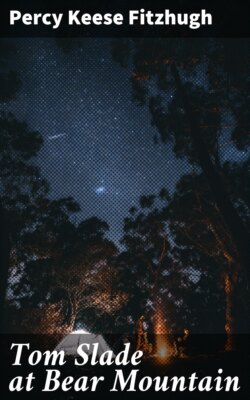Читать книгу Tom Slade at Bear Mountain - Percy Keese Fitzhugh - Страница 9
На сайте Литреса книга снята с продажи.
CHAPTER VII
JUNE AND DECEMBER
ОглавлениеTable of Contents
It was now mid-afternoon and I could not linger at old Buck’s cabin. But I sat upon the doorstep with him for a few minutes while he performed on that cartridge shell instrument of his. I actually saw him lure one of those noisy bluejays almost within reach of his arm, and I think he would have captured it if his granddaughter had not laughed aloud at my astonishment.
By using the shell in conjunction with a pebble he could reproduce the appalling sound of a rattlesnake. No rattlesnakes appeared, however. The girl assured me it was a “sure enough take off.” I don’t know; I have never heard a rattlesnake. I told her that if I ever heard that sound, even in church, I would run, which seemed greatly to amuse her. “’Fraid cat!” she said, and added that there were “heaps and heaps and heaps” of rattlesnakes around there. I told her one small heap would be enough for me. Her innocent amusement at my tenderfoot quality was very pretty to see. And her buoyancy against the background of her old grandfather’s lazy manner and drawling voice was very attractive.
I suspected she was right about the rattlesnakes. I have always associated rattlesnakes with hollows and gullies and impenetrable depths of thicket. Whenever you visit a neighborhood of weird and haunting wildness you will be told (by people who have not put it to the test) that there are rattlesnakes there. The rattlesnake seems to be a sort of symbol of the dark and forbidding spots in nature—gloomy fastnesses, dank caverns on mountainsides, and the like.
Be that as it might, this spot seemed to me the very ideal habitat of those dreadful reptiles. It derived its name not only from them, but from a small gulch which broke the woods and was all but hidden by a maze of interwoven brush which grew in the depth of that horrid place and luxuriantly overflowed its brink. You might step into this gaping trap of nature without knowing it.
Long Buck told me that once a brook had flowed through that overgrown hollow and that a time had been when he and his primitive neighbor Conner had got their water there. What a company they must have made in those old days—Buck and Mink Havers and Conner! What a life they must have led in that remote wilderness!
Buck’s cabin was upon the brink of this gulch and by following its course (which as I said was now indicated by a ridge of overflowing brush) you came to the area of scattered stone which had once been the foundation of Conner’s cabin. Near to that, and somewhat included in the area of overgrowing thicket, was the black hole which had been Conner’s well. It seemed unlikely that rattlesnakes would miss such a place. It was hard for me to believe that not so far distant the encircling White Bar Trail of the Boy Scouts crossed the invisible private trail of these lusty old settlers. Though to be sure the White Bar Trail is no boulevard.
Old Buck accompanied, or rather guided, me back to the hamlet, and June went along oblivious to crowding brush and prickly brambles. Once she really startled me by calling, “Rattlesnakes!” But she played the trick too much, as children will, and I became a model of courage, heedless of her warnings.
The last I saw of the two of them, they stood near my car where it was parked in a sort of alcove in the country road, and they made a very pretty picture—June and December. As I rode away I saw them return along the trail until their own familiar woodland again closed in about them. Then I was sorry I had not asked old Buck about the story of the girl’s parents. I have never known where they lived nor how and when they died.
I had now, as they say, to go all around the mulberry bush again, or part way at least, and as I drove up what they call the Haverstraw road toward the headquarters lake (as I called it) the thought that was uppermost in my mind was that a lucky chance had put me in the way of meeting, and even visiting, one of the picturesque old settlers of that region.
As sure as I am sitting here writing, old Buck’s rather dubious reminiscence of his former glory and his clashes with the authorities did not greatly interest me. Certainly I was not greatly prejudiced against him because he had circumvented one or another good regulation of the state, goodness knows how many years ago. I have yet to hear anybody denounce Robin Hood for his outlawry; I know that the modern world thinks only of his romance. A few bears or deer or wildcats more or less before I was born are not worrying me now.
But Long Buck Sanderson is one of my treasured memories. I confess that I could not help wondering whether this shrewd, hardy old woodsman had perhaps regarded the laws of civilization rather lightly; that would not necessarily conflict with a sturdy sense of private honor—the fine, crude honor of pioneers. As I drove along part of an old stanza came jumping into my head.
For why? Because the good old rule,
Sufficeth them. The simple plan.
That he shall take who has the power,
And he shall keep who can.
And anyway, the most conspicuous thing about Long Buck Sanderson was his love for his little orphan granddaughter, and his concern for her when she should find herself alone in the world. So I think he could never have been very bad, any way you look at it....
